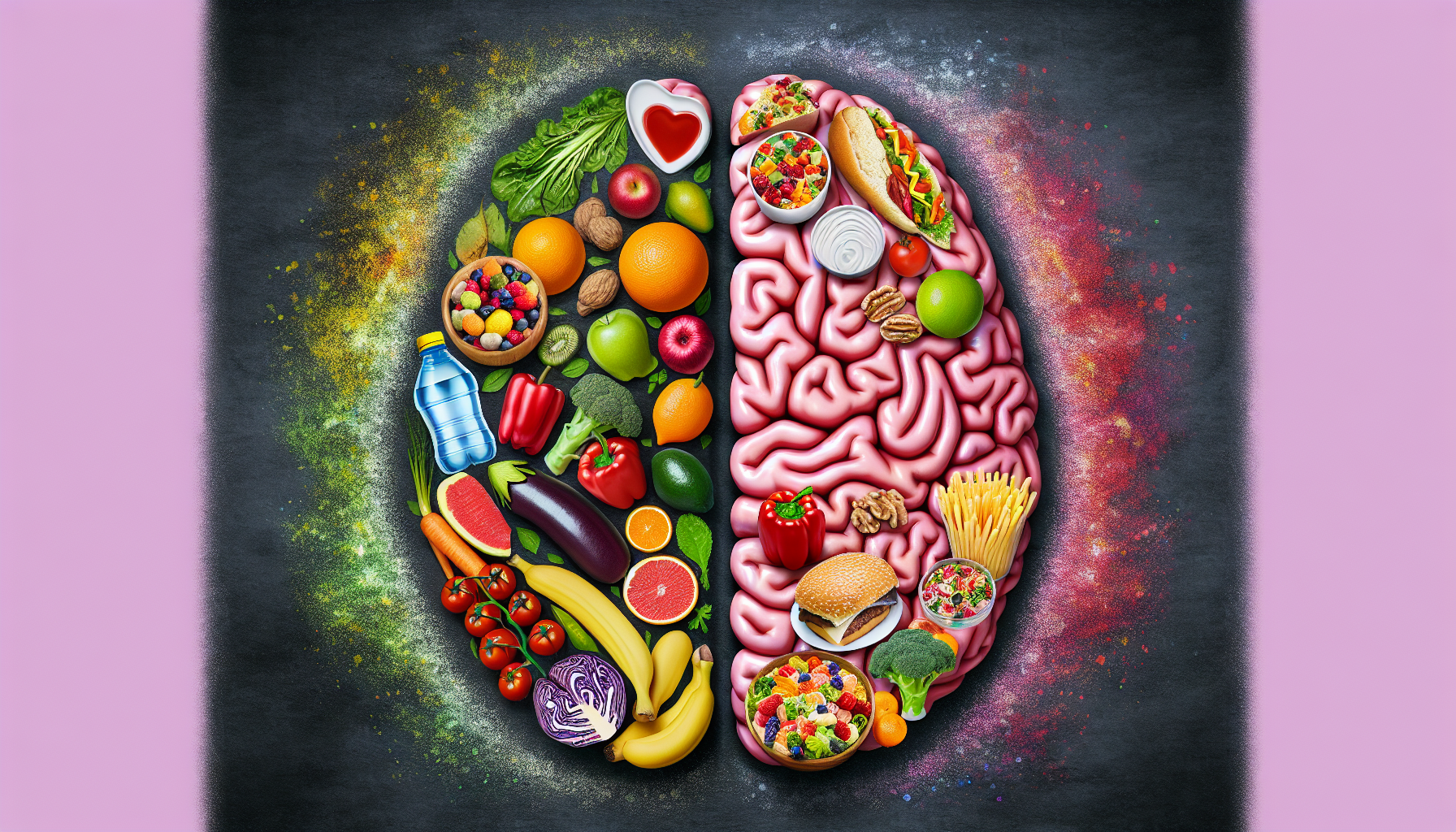Are you curious about the link between poor diet and the risk of Alzheimer’s or dementia? Recent scientific studies have delved into this topic, shedding light on the potential impact of our food choices on our brain health. One study published in the Journal of Alzheimer’s Disease found that a diet high in saturated fat and refined sugars may increase the risk of cognitive decline and dementia. Another study from the Journal of Nutrition, Health & Aging showed that diets rich in fruits, vegetables, and whole grains are associated with a lower risk of cognitive impairment and dementia. These findings highlight the importance of a healthy diet in promoting brain health and may provide valuable insights into preventive strategies for cognitive decline.
Discover the Ultimate Weight Loss Secrets Here!
Overview of Alzheimer’s and Dementia
Definition of Alzheimer’s disease
Alzheimer’s disease is a progressive brain disorder that affects memory, thinking, and behavior. It is the most common cause of dementia, accounting for 60-80% of all cases. The disease usually starts slowly and gradually worsens over time, leading to severe impairment in daily functioning.
Definition of dementia
Dementia is a broader term that encompasses a group of symptoms affecting cognitive abilities such as memory, thinking, and reasoning. It is not a specific disease, but rather a syndrome caused by various conditions, including Alzheimer’s disease. Other common causes of dementia include vascular dementia, Parkinson’s disease, and Lewy body dementia.
Prevalence and impact on society
Alzheimer’s disease and other forms of dementia have a significant impact on individuals, families, and society as a whole. According to the World Health Organization, around 50 million people worldwide have dementia, with approximately 10 million new cases diagnosed each year. The number of people affected is projected to triple by 2050. Dementia not only affects the quality of life of individuals but also places a heavy burden on caregivers and healthcare systems.
Relationship Between Diet and Brain Health
Importance of nutrition for overall health
Good nutrition is essential for overall health, and this includes brain health. The brain requires a constant supply of nutrients to function optimally and maintain its structure. A well-balanced diet provides the necessary vitamins, minerals, antioxidants, and other essential nutrients that support brain function and help protect against cognitive decline.
Effects of diet on brain function
Research has shown that diet plays a crucial role in brain function and can influence cognitive abilities. Certain nutrients, such as omega-3 fatty acids, vitamins B12 and D, folate, and antioxidants, have been linked to improved cognitive function, while deficiencies in these nutrients have been associated with increased risk of cognitive decline.
Types of diets and their impact on cognitive health
Different dietary patterns have been studied to determine their impact on cognitive health. The Mediterranean diet, which emphasizes fruits, vegetables, whole grains, legumes, nuts, healthy fats like olive oil, and moderate consumption of fish, has been consistently associated with a reduced risk of cognitive decline and Alzheimer’s disease. Additionally, the Dietary Approaches to Stop Hypertension (DASH) diet, which focuses on fruits, vegetables, low-fat dairy products, whole grains, lean proteins, and limited sodium, has also shown a protective effect on cognitive health. Plant-based diets rich in fruits, vegetables, whole grains, and legumes have also been linked to a lower risk of cognitive impairment.

Click Here for Proven Fat-Burning Strategies!
Scientific Studies Investigating the Diet-Alzheimer’s Connection
Dietary Patterns and Risk of Alzheimer Disease
A study conducted by Morris et al. (2015) investigated the association between dietary patterns and the risk of Alzheimer’s disease. The study found that adherence to a dietary pattern rich in fruits, vegetables, whole grains, poultry, fish, and low-fat dairy was associated with a reduced risk of Alzheimer’s disease. On the other hand, a dietary pattern high in red meat, processed foods, and sweets was associated with an increased risk.
Mediterranean Diet and Incidence of Alzheimer Disease
In a study by Scarmeas et al. (2009), the researchers examined the association between adherence to the Mediterranean diet and the incidence of Alzheimer’s disease. The study found that individuals who closely followed the Mediterranean diet had a significantly lower risk of developing Alzheimer’s disease compared to those who did not adhere to the diet. The protective effect was even more pronounced in individuals with a genetic risk for the disease.
Adherence to a DASH-Style Diet and Risk of Incident Alzheimer Disease
A study by Morris et al. (2015) explored the relationship between adherence to the DASH diet and the risk of Alzheimer’s disease. The study found that individuals who followed the DASH diet had a lower risk of developing Alzheimer’s disease compared to those who did not adhere to the diet. The protective effect was particularly evident in individuals with hypertension.
These studies highlight the importance of diet in reducing the risk of Alzheimer’s disease and provide valuable insights into specific dietary patterns that may have a protective effect on cognitive health.
Factors Affecting Diet-Related Alzheimer’s Risk
Role of specific nutrients
Certain nutrients have been identified as playing a crucial role in brain health and reducing the risk of Alzheimer’s disease. For example, omega-3 fatty acids found in fatty fish, walnuts, and flaxseeds have been associated with improved cognitive function. Vitamin B12, found in animal products like meat, fish, and dairy, is essential for brain health as it helps maintain the integrity of nerve cells. Other nutrients, such as antioxidants found in fruits and vegetables, and folate found in leafy greens, have also been linked to a lower risk of cognitive decline.
Caloric intake and obesity
Overconsumption of calories and obesity have been associated with an increased risk of Alzheimer’s disease. Excessive caloric intake can lead to insulin resistance and chronic inflammation, both of which are risk factors for cognitive decline. Maintaining a healthy weight through a balanced diet and regular physical activity is important for reducing the risk of Alzheimer’s disease.
Gut health and the microbiome
Emerging evidence suggests that the gut microbiome, the community of microorganisms residing in our digestive system, plays a role in brain health. Disruptions in the gut microbiome, often caused by an unhealthy diet, have been linked to cognitive decline and an increased risk of Alzheimer’s disease. A diet rich in fiber, prebiotics, and probiotics can promote a healthy gut microbiome and may help protect against cognitive decline.

Unlock Your Path to a Healthier You!
Unhealthy Diets and Alzheimer’s Risk
High intake of saturated fats
Diets high in saturated fats, commonly found in red meat, full-fat dairy products, and fried foods, have been associated with an increased risk of Alzheimer’s disease. Saturated fats can promote inflammation, oxidative stress, and impair insulin signaling, which can contribute to the development of cognitive decline.
Excessive consumption of refined sugars
A diet high in refined sugars, such as those found in sugary beverages, desserts, and processed foods, has been linked to an increased risk of cognitive decline and Alzheimer’s disease. High sugar intake can lead to insulin resistance and inflammation, both of which can negatively impact brain health.
Processed food and additives
Processed foods often contain high levels of unhealthy fats, sugars, and additives, and are typically low in essential nutrients. Regular consumption of processed foods has been associated with an increased risk of cognitive decline and Alzheimer’s disease. Opting for whole, unprocessed foods is a healthier choice for brain health.
Healthy Diets and Their Protective Effects
Mediterranean diet
The Mediterranean diet, characterized by a high intake of fruits, vegetables, whole grains, legumes, nuts, healthy fats like olive oil, and moderate consumption of fish and wine, has been consistently associated with a reduced risk of cognitive decline and Alzheimer’s disease. The combination of various nutrients and antioxidants in this diet, along with the beneficial effects of healthy fats like omega-3 fatty acids, contributes to its protective effects.
Dietary Approaches to Stop Hypertension (DASH) diet
The DASH diet, originally developed to lower blood pressure, has also shown protective effects on cognitive health. This diet focuses on fruits, vegetables, low-fat dairy products, whole grains, lean proteins, and limited sodium. By promoting heart health, the DASH diet indirectly supports brain health, reducing the risk of Alzheimer’s disease.
Plant-based diets
Plant-based diets, which emphasize fruits, vegetables, whole grains, legumes, and nuts, have been associated with a lower risk of cognitive impairment. These diets are typically high in antioxidants, vitamins, minerals, and other beneficial compounds that support brain health. Plant-based diets may also help reduce inflammation and oxidative stress, which are thought to play a role in the development of Alzheimer’s disease.

Impact of Lifestyle Factors on Alzheimer’s Risk
Physical activity and its role in dementia prevention
Regular physical activity has been associated with a reduced risk of cognitive decline and Alzheimer’s disease. Exercise promotes healthy blood flow to the brain, stimulates the release of beneficial chemicals, and may help reduce the risk factors associated with dementia, such as obesity, hypertension, and diabetes. Engaging in both aerobic exercise and strength training is important for optimal brain health.
Smoking and alcohol consumption
Smoking and excessive alcohol consumption are harmful to overall health, including brain health. Smoking has been linked to an increased risk of cognitive decline and dementia, while excessive alcohol intake can impair cognitive function. Quitting smoking and moderating alcohol consumption are important steps in reducing the risk of Alzheimer’s disease.
Importance of mental stimulation and social engagement
Keeping the brain mentally stimulated through activities such as reading, puzzles, learning new skills, and social engagement has been associated with a lower risk of cognitive decline and Alzheimer’s disease. Challenging the brain regularly can help build cognitive reserve, which refers to the brain’s ability to withstand the impact of age-related changes and degenerative diseases.
Age and Genetic Factors in Alzheimer’s Risk
Influence of age on diet-related risk
Advanced age is the most significant risk factor for Alzheimer’s disease. However, it is important to note that a healthy diet can still positively impact brain health, even in older individuals. Adhering to a nutrient-rich diet and following healthy lifestyle habits can help reduce the risk of cognitive decline and delay the onset of Alzheimer’s disease.
Genetic predisposition and susceptibility
Genetic factors play a role in determining an individual’s risk of developing Alzheimer’s disease. Certain gene variants, such as the ApoE4 allele, have been associated with an increased risk. However, having a genetic predisposition does not guarantee the development of the disease. Lifestyle factors, including diet, can still influence the risk of Alzheimer’s disease, even in individuals with a genetic susceptibility.

Promoting Healthy Diets for Brain Health
Public health strategies
Public health strategies aimed at promoting healthy diets for brain health can play a crucial role in reducing the prevalence of Alzheimer’s disease. This includes initiatives to increase awareness of the importance of nutrition in cognitive health, providing access to affordable and nutritious foods, and implementing policies that discourage the consumption of unhealthy foods and beverages.
Educational campaigns and awareness
Educational campaigns targeting individuals, families, and healthcare professionals can help increase awareness of the relationship between diet and brain health. Providing evidence-based information on the benefits of specific dietary patterns, along with practical tips for implementing healthy eating habits, can empower individuals to make informed choices for their brain health.
Guidelines for healthy eating to prevent Alzheimer’s
Developing and disseminating clear guidelines for healthy eating to prevent Alzheimer’s disease can provide individuals with a roadmap for making dietary choices that support brain health. These guidelines should emphasize the importance of a balanced diet that includes a variety of fruits, vegetables, whole grains, lean proteins, healthy fats, and limited intake of processed and sugary foods.
Conclusion
In conclusion, a growing body of scientific evidence indicates that diet plays a crucial role in the development and prevention of Alzheimer’s disease and dementia. Adhering to a healthy diet, such as the Mediterranean or DASH diet, can have profound effects on cognitive health and may reduce the risk of cognitive decline. Specific nutrients, caloric intake, gut health, and lifestyle factors also significantly impact brain health. Public health strategies, educational campaigns, and guidelines for healthy eating can promote brain health on a societal level. It is clear that a healthy diet is not only important for overall health but also for the preservation of cognitive abilities and the prevention of Alzheimer’s disease. Further research in this field will help deepen our understanding of the complex relationship between diet and brain health, providing insights for future interventions and policies to tackle this global health challenge.

